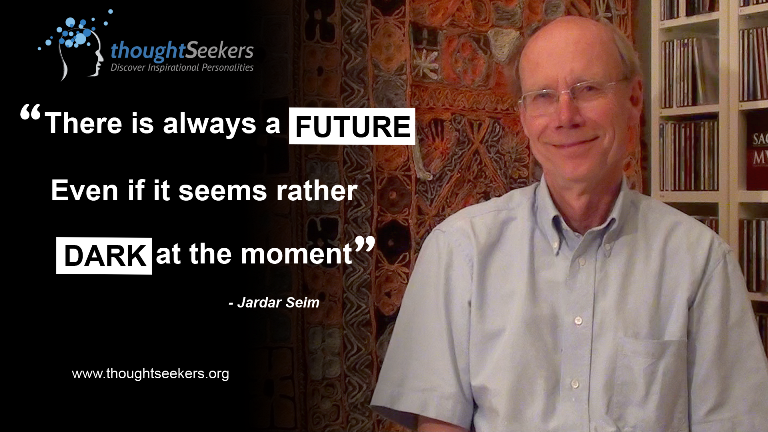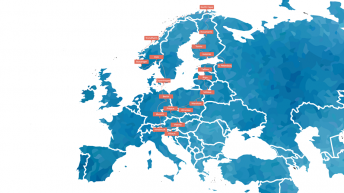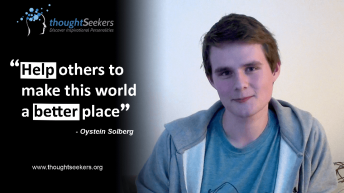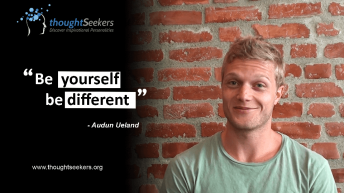Jardar Seim, thoughtSeeker
When did you first visit Romania?
I began my relationship with Romania in 1965, when I was a young student. By some circumstances I happened to be the first Exchange Student from Norway to Romania based on an agreement between the two countries, but the exchange was one way at that time. No Romanian student arrived at Norway that year. I was in Romania for 8 months, I learnt the local language, got my first impressions about the country and I started later on as a historian. Being interested in the Romanian and the Eastern European history, I followed up with a lot of visits.
Were you in Romania around the time the revolution in 1989 took place? Could you describe those moments
That was one of the most interesting moments from my visits in Romania, because when the communist regime fell, then all the regimes fell in Eastern Europe. Romania was one of the last countries where it happened in December ‘89 and I have been commenting on Eastern Radio and television and in newspapers on the situation, since I’ve had written some articles about Romania. So I was asked to go with a journalist from the Norwegian State Radio and Television to Romania. We arrived there after the fall of Ceausescu in December ‘89 and it was very strange. It was strange because I remembered from several visits in Romanian during the 80’s how dissatisfied the people were of this regime. To me it’s even stranger that people, who today keep saying it was better before, at that time, because they had work, were saying that the regime has to go.
You could feel at that point, how people were sad and disappointed, how the society was quite unstable. I remember I had to go the Belgrade first and we requested to enter Romania in Drobeta-Turnu Severin. At the border we went to the guards, who were military people, and they were burning communist propaganda literature. So that was my first impression of Romania after communism.
We traveled the country the next day, by car, to Bucharest. People there had so unrealistic expectations “now we are free, now we can say what we want, we will get rich”. All sort of expectations and of course not all of them have been fulfilled. However, it was very impressive coming there, meeting people on the streets of Bucharest. It was impressive to distribute the first non-communist newspapers on the streets.
Then at the same time, a lot of people were living in fear. It was part of the game, a political game, to make people afraid of terrorists, of getting shot at night. That is why people were not allowed to go on the streets at nighttime. It was a strange situation, with people coming out in the city at daytime and almost nobody outside at nighttime. People walked out of the buildings in fear of getting shot. People were telling us stories about going to the cemeteries, to visit the graves of their loved ones, killed after the fall of Ceausescu. And even more so, people didn’t know who got shot, in all that uncontrolled shooting. I have a strong visual of a cemetery we went to: there were lories coming in, with coffins, and the priests were going from one to another. It was almost like an industrial sort of burial.
How did you begin school in Romania, before the fall of the dictatorship? How did you decide you want to help people?
We had a contact with a school in Brasov, Romania. Together with many colleagues, most of them history teachers, we went in May ‘89 to Romania. We wanted to see how Romania was doing and we wanted to visit some historical sites.
We were promised to visit a school but all the communist authorities were not so eager to let us in and to speak to teachers, our colleagues. We managed to talk to teachers after all. That school was in Brasov and we were very heartily received. After the revolution we got in touch, to offer our support, because we knew there was much poverty in Romania. There were a lot of actions, not only from Norway, from a lot of western countries, to offer some relief. Some donated food, others, clothes. Some things were needed, others weren’t. Because you don’t always think about what the receiver needs.
So we talked to the teachers and got some idea of what sort of teaching materials they needed and what we could supply. That was how it started. It was not a big action, it was not like we were going to save Romania or the future of the country. We didn’t think of ourselves.
After the fall of communism we brought a folklore group from Romania to Oslo and the surrounding area. We managed to get them to our school, to perform for the whole school in a big concert hall there. And I remember people were so impressed. So they tried to help in some way, and they organized a money collection.
Why did you feel responsible to help them?
I didn’t feel responsible to help. It was quite natural because after the fell of the communism, Romania was considered the poorest of the new democracies in Eastern Europe. In Hungary you had had the economic reforms, you had higher standards of living. Czechoslovakia, even, was more developed. East Germany too! So Romania and Bulgaria, even more so Albania were so poor. And Yugoslavia was also poor but at that time it was a peaceful country, nothing had happened there yet.
What drove you to keep helping?
Well the driving force was that in those circumstances you get some bright idea. Maybe that idea may not have been very original, and this wasn’t! But what was original was that we tried to help in areas in which others didn’t. I mean not money, nor food, nor clothes.
So that was the only original thing with the idea. We always did what we felt. After the idea you think how to carry on. How can you make it a success? How much time will it take? How come you did that? There were many questions. We wondered how we could ship the donations to Romania in an efficient way. How could we collect the things needed in that school?
We couldn’t think of all the schools, of course many of them needed higher standards of teaching material, but we concentrated on making a difference. We didn’t have the power to establish connections, between schools, such like an NGO could have. We just helped! It was not a business, it was not an enterprise. We just wanted to do something on the level we already were.
How do you keep the exchange between Romanian schools and Norwegian schools?
First I’m obliged to say that we were several teachers present on that first trip to Romania, to that school. Well I cannot say who got the idea first. It naturally developed that we should try to do something more than sending things, but perhaps let people from both countries experience how life is in the other country. And if someone had asked for explanations we would have had arguments for our decision. We would have said that for Norwegian students it may be very important to experience life in another part of Europe, a part which is very poorly known. And was even more poorly known. And at the same time, we thought about our Romanian colleagues and we got their support. And we thought of the Romanian students, trying to build a democratic society, not copy it.
They were novices and the background was very different. But there were some ideas and some experiences. I mean democracy is not just, it’s not only to let the majority decide, but it’s also to listen to other people. To have more voices at the same time. So we thought to see how life is and what we have in common, nut also what is very different from one country to another.
Then, in 1993, we started by inviting teams of teachers and students and paying for these small groups. At that time it was not easy to get a visa for Norway, especially for a Romanian. The interesting parenthesis is that during communist time there was no need of visa. Romanians didn’t need a visa to go to Norway. And Norwegians didn’t need a visa to go to Romania. But when Romanians were free to travel they needed passports and then, suddenly, they got new visa regulations.
A few months later after the first visit from the Romanian group, a Norwegian group, first time a small group, went to Romania. We went by plane to Budapest and by train from Budapest to Brasov. After that for a period of 15 years we had regularly exchanged programs. That meant students stayed one week in a private family in the other country, and not in a hotel. From the beginning from the Norwegian side it was the students of social sciences. Because that was the point: to know something about a country, you should not only be in that country, to feel the atmosphere, you should also try to find something about how politics works, how society regulates.
Did you notice a change in students’ thinking?
It’s very difficult to say something general about it. But for most of the Norwegian students who went to Romania it was hard for them. Some young people didn’t like the food, even if the family where they were living came up with the best food. Other students perhaps didn’t like other students, or maybe they had a pessimist way to see things. However, generally speaking they were very glad they had this experience. For instance, they experienced similarities for pop music. Music was a very common language. Because they listened to the same music. And of course there many differences, and they noticed those when they came back home. The role of the family, ties and the Romanian society were different. Also, the relation between the generations was different. I think it’s colder in Norway. Not only in the wintertime, but also for instance between generations.
What do you think is the most important result you achieved through this exchange program, and not only personally but for others?
I still find it hard to make some sort of selection about what has been done, because there are many perspectives on this, from a teaching point of view. It is perhaps a more general result. To have moreover teaching by experience. In a normal curriculum here you didn’t read about it very much of the all. It was sort of an addition to what is the normal written curriculum. So that was quite satisfying to have this way of the learning about another country, another culture.
That is from a more rational point of view. And then you have the human relationships. And I know that several of those who participated kept in touch later on. There have been also examples of Norwegian families who had visited students in Romania. Or who have travelled on holidays to Romania afterwards. So people kept in touch and that is also one important effect of such a program.
Of course we didn’t set that as a goal before it started. We thought that this was meaningful enough in itself. And we thought can just pick up some advantages, some positive consequences. I don’t think there were any important negative consequences. We didn’t destroy anything! Or maybe we destroyed some myths about the other country. But, as a historian I think it’s always good to destroy myths.
What would be your final word for readers and viewers. Maybe you could say it in Romanian?
These final words were in reference to that time we started in Romania, but they aren’t just suitable for the past. They are suitable for present times in Romania
Întotdeauna există un viitor, chiar dacă pare sumbru pentru moment
What does this mean in English?
There is always a future, even if it may look rather dark at the moment.







Add comment